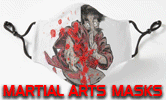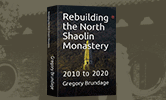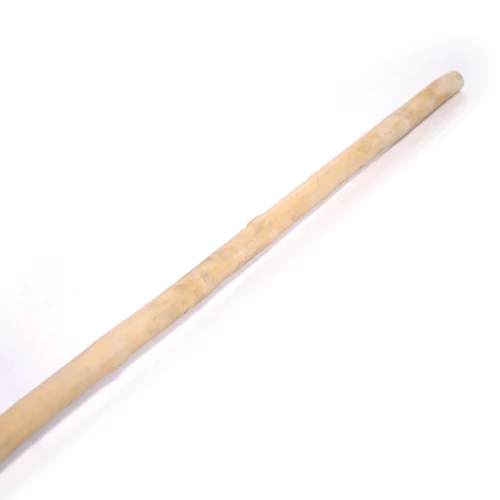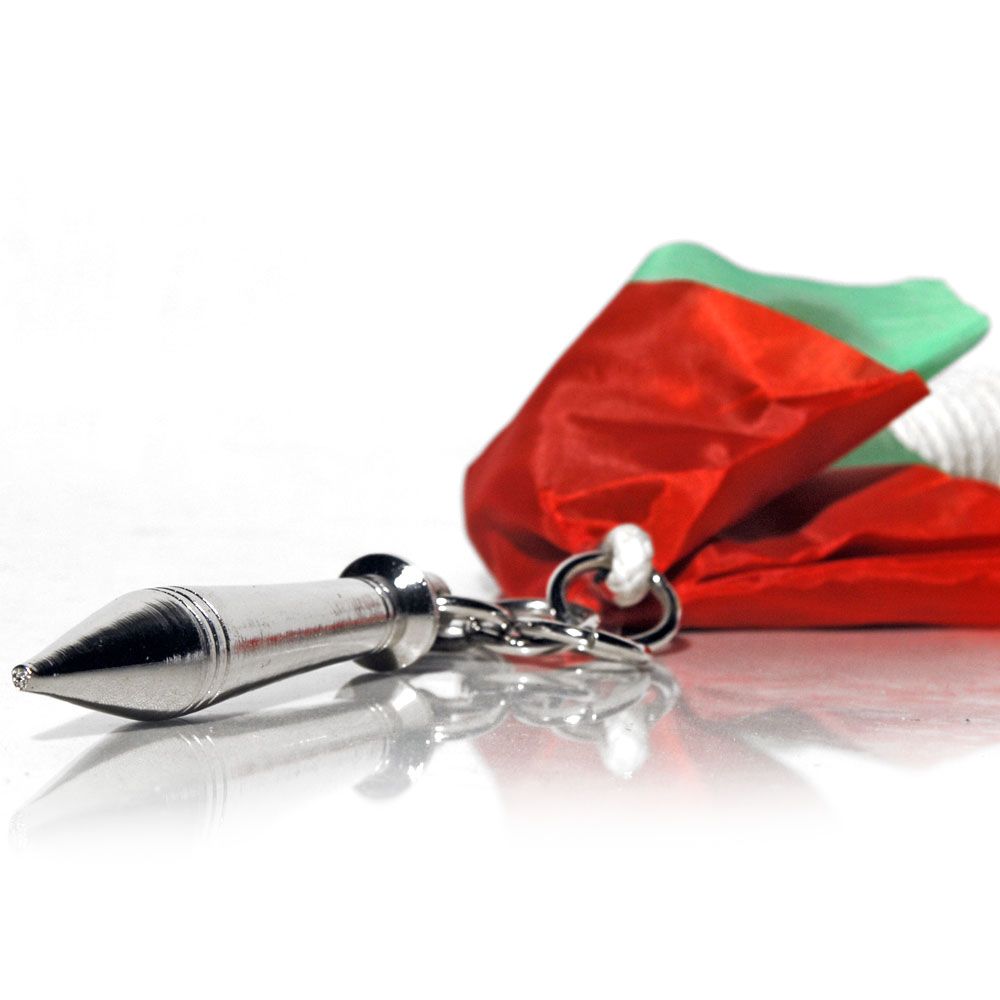By Martha Burr
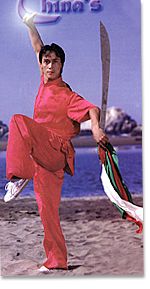 China's Brightest Star
China's Brightest Star
For most participants, Rome's Fourth World Championships marked a milestone in their athletic careers. But for Yuan Wen Qing, who won his last gold medal before finally retiring from wushu competition, it marked the end of an era. And so it did for us as well.
As someone once put it, Yuan Wen Qing is like the Michael Jordan of China. There, where martial arts is an essential part of sport and culture, he has been its top star since the mid-eighties, winning over sixty gold medals in national and international competitions.
"I was nine years old when I started martial arts," he says. "I didn't know about teams or competitions, I only did it because it was fun." That was 1975. ?In 1980, with his Shanxi team, he started to compete in national competitions like the National Invitationals. ?In 1988 international wushu competitions started, and he began to exhibit his talents to the rest of the world. Some medals were harder earned than others, like the one from the first Asian Games in 1990. Or in 1989, competing on the China National Team. "I wanted to get the gold medal from the Beijing Team, and beat the previous champion," he recalls. He did.
Two years ago at age twenty nine, Yuan Wen Qing started to retire. Already that was old for a wushu athlete to still be competing, unless, of course, you are China's best. But he decided to compete this year again in the China International Games because China changed the competition rules to add more difficult moves. "By then I was the oldest competitor from a professional team," he says," and the competition was very tough. But I kept competing, because I wanted to test myself." After winning that competition he went to Rome to help promote wushu to the rest of the world.
The Last Gold Medal
To compete at the Fourth World Championships was hardly a challenge for Yuan Wen Qing. The competition is made up of compulsory forms, designed to develop wushu around the world and bring other countries up to speed, but in China compulsory forms are not sophisticated enough for their teams to compete with.
So when Yuan Wen Qing took the floor, of course he made it look easy. His incredible speed and height dazzled the cheering crowd who had waited expectantly all day as the lengthy (77 competitors) changquan event went on. When Yuan Wen Qing walked into the ring the stadium went wild, then fell silent. With his first move, his expression of calm changed to one of fierce intensity. Every movement was precise, fluid, powerful. The height of his jumps elicited gasps from the audience, then more cheers. The other changquan competitors stood mesmerized in awe and delight, forgetting for these brief moments their own performance or standing. For these few minutes we all transcended the routine of the competition and watched, transfixed, the man who truly is the soul of wushu.
Yuan Wen Qing took the gold easily with a 9.71, compared to the silver 9.36. Afterwards crowds rushed the floor for autographs and pictures, and the star patiently, graciously accomodated every request.
Inventing the Compulsories
Perhaps the reason Yuan Wen Qing made the changquan compulsory routine look so easy is that he invented it. When China began holding international wushu competitions in the late eighties, it ?realized that a compulsory form was needed to standardize the basic movements of the forms. At that time Yuan Wen Qing was the top athlete and so the ideal person to help create them. His resulting changquan and staff routines are now known and practiced around the world. It took him about two months to create the forms, or rather to complete the teaching formats. "Making the form up, that was easy," he says. "But writing it down, illustrations, that process took more time."
Wushu to the World
As wushu has developed over the last decade and has begun to spread out through the world, China has also been happy to show off Yuan Wen Qing as the best of the best on international tours and demonstrations. America last saw his shining talents in 1996 when the Chinese Wushu Association ?and the USAWKF organized a fundraising tour of fifteen ?US cities with a group of Chinese athletes from different provinces. Yuan Wen Qing was of course the leading star, and audiences from New York to San Francisco were privileged to see wushu's golden talent. "Every time Yuan Wen Qing appeared on stage," recalls Anthony Goh, who led the group's tour, "the audience just immediately responded to his speed, his height, the special beauty of his techniques. Most of them had never seen anything like that, or that level of quality in wushu. And as a person, Yuan Wen Qing was also extremely nice to work with, very cooperative, non-egotistical. We had a great time on that tour."
With the performance out of the way in New Orleans, the wushu star also got to enjoy some of the local sights and attractions with a group of American wushu and sanshou athletes there for Shawn Liu's U.S. Open. After a night of exotic French Quarter drinks and dancing, by three in the morning Yuan Wen Qing and Jason Yee were comparing taiji forms down Bourbon Street.
"It reminded me of when we were in Malaysia," laughs Yee, recalling his second World Championship experience competing in forms in 1993. "Of course he won all his events, and then we went out to celebrate. The next day my head was pounding, and he had to perform in the demonstration. He just went out there and switched on like a light - and gave the most incredible performance.
"As a competitor then, I was impressed with so many aspects of his perfromance and his techniques. In Malaysia I grabbed his broadsword and I was surprised that it was really heavy, the heaviest wushu sword I'd ever felt. A lot of players try to cheat by getting a very light sword, but his is genuinely heavy and he makes it look really light, he makes it whistle. His technique is all speed and momentum, he uses his full body movement to create this incredible momentum. He's shorter than me, but he can jump over my head. He's the first person in China to do the double twist - and you need serious height for that. His precision, and his grace - they are so impressive. His own routines - especially his broadsword routine, with elements like the butterfly twist - are really difficult. And of course his staff routine is incredible too, and like his sword, it's one of the heaviest, most solid staffs I've picked up. He was joking with me once, saying that he does everything so fast so that the judges can't see any mistakes. His wushu is just so sophisticated, so powerful, and always amazing."
In Rome it was both a beginning and an end for Yuan Wen Qing. As a competitor in China he has invented difficult techniques, and raised the standard of ?performance to his high level. As an ambassador for wushu he has shown thousands of people worldwide what this high level is, and in creating compulsory forms he has helped lay the foundation for the growth of the sport everywhere outside of China.
Endings and Beginnings
At these last World Championships it was almost bittersweet to watch his last competition performance, and to see him receive what will likely be his last gold medal. But after his longfist routine he looked happy. He joked easily with his teammates, sat down as a friend with the press, and talked to all the competitors who looked to him for wisdom or guidance. Through the five days of the Championships he was always good natured, interested in the competion, and fun to be around. Only from the constant barrage of fans asking for photos and autographs could you tell that he is wushu's most famous star. Retiring from competition must bring not only a sense of closure, but also a sense of relief and new challenges for Yuan Wen Qing, as well as some more personal time. Though he earns fame and status and money with his talents and hard work, the pressure is also intense. He is expected both by those around him and by himself to be a champion and a role model. The schedule of hours, days, weeks and months he spends training and travelling are grueling; He was married three years ago, and out of those three years has only been able to see his wife for three months.
When I asked him what his plans for the future are after his retirement, he told me that he wants to pursue a movie career. Not because its easy, and not for fame or money either; Yuan Wen Qing looks at martial arts movies today and doesn't see enough martial arts that he likes. "I don't like the wires, and the fake gimmicks," he says. He wants to see more real art of wushu in the art of film. "Movies need to have really good wushu, to show people, show audiences everywhere, what really good wushu is. And it needs to show wu de (the martial spirit.) I want to raise the level of those things in the movies I do." Already last year he starred in two productions, one television show, and one film. I asked him how the transition was from wushu to acting, and he replied that it was easy, because in his wushu he was used to a lot of performance and expresssion.
In the end, it is ultimately Yuan Wen Qing's expression that transforms his wushu from a sport to an art. When you watch him perform there is some intangible convergence of ?his speed, his precision, his technique and his style. But to complete this convergence, what he really puts into his wushu is his innermost spirit. When you look in his eyes what you see is the fire, and the passion, and the very soul not only of Yuan Wen Qing, but of wushu itself.
Click here for Feature Articles from this issue and others published in
1998 .
Written by Martha Burr for KUNGFUMAGAZINE.COM
![]() Print Friendly Version of This Article
Print Friendly Version of This Article






